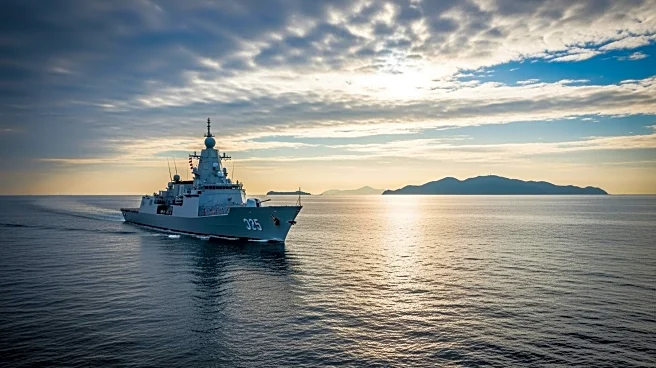What's Happening?
The Pentagon is increasing its naval presence in the Caribbean, redirecting the USS Gerald R. Ford aircraft-carrier strike group from the Mediterranean to the region. This move is part of efforts to enhance
U.S. capabilities in detecting and disrupting illicit activities. The deployment includes over half a dozen American warships, marking the largest U.S. naval presence in the Caribbean since the Cuban missile crisis. The U.S. has conducted operations against drug traffickers and alleged terrorists off the coast of Latin America, resulting in the deaths of more than three dozen individuals. However, critics have raised concerns about the lack of evidence supporting these claims, suggesting potential extrajudicial actions.
Why It's Important?
The increased U.S. naval presence in the Caribbean signals a significant shift in military strategy, potentially impacting regional stability and U.S.-Venezuela relations. The deployment aims to counter illicit activities but also raises questions about the broader geopolitical implications, including the possibility of military interventions in Venezuela. The move could strain diplomatic relations and provoke responses from Venezuela and other regional actors. Additionally, the operations highlight ongoing debates about the legality and ethics of U.S. military actions in foreign territories.
What's Next?
The situation may lead to heightened tensions between the U.S. and Venezuela, with potential diplomatic and military responses from Caracas. The U.S. may continue its operations in the region, possibly expanding its focus beyond drug trafficking to other security threats. Observers will be watching for any changes in U.S. policy or further military deployments, as well as reactions from international stakeholders concerned about regional stability and human rights implications.
Beyond the Headlines
The deployment raises ethical and legal questions about the use of military force in foreign territories, particularly concerning the justification and transparency of operations targeting alleged criminals. The situation may also influence U.S. foreign policy in Latin America, affecting trade, security cooperation, and diplomatic relations. Long-term, the increased military presence could alter regional power dynamics and influence U.S. strategic interests in the Western Hemisphere.









